Delaware Park: Looking to overcome “difficult obstacles”
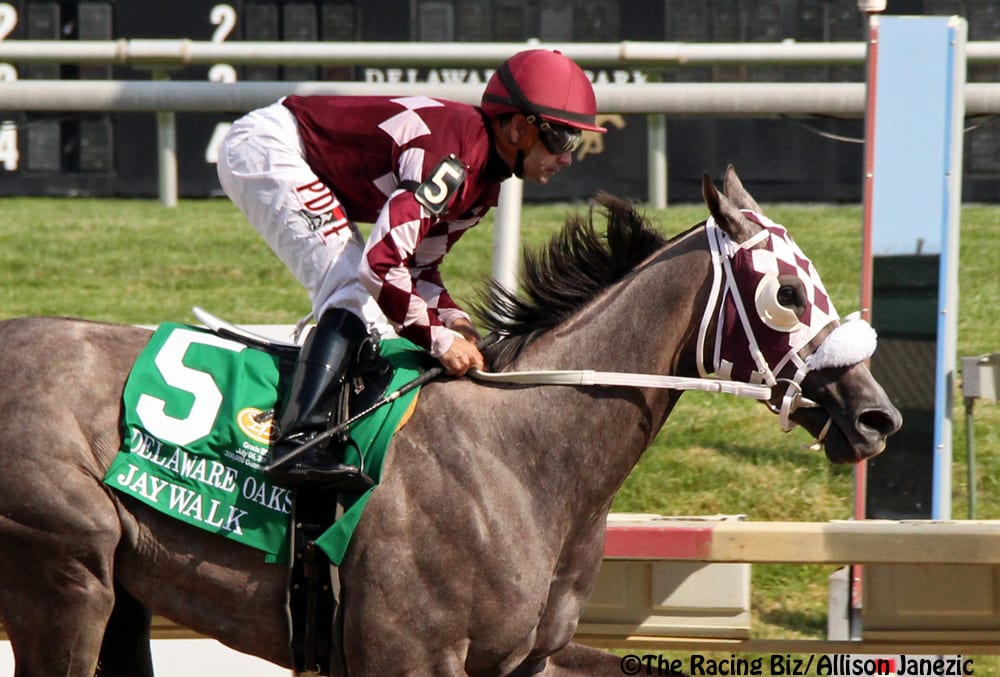
Jaywalk and Joe Bravo won the G3 Delaware Oaks. Photo by Allison Janezic.
The 2019 Delaware Park live racing season was one that saw the storied oval struggling with much the same problem that faced many tracks around the country: not enough horses to support a racing program that could offer racing fans full and competitive fields.
The question now is how to move forward. Among the possibilities likely to be under consideration: a later opening and/or modified early-season schedule and tweaks to the racing program itself. The track could also benefit from improved regional cooperation, a bolstered population of Arabian horses, and, well, a little bit of good luck after a seaon which, among other things, saw a single case of strangles negatively impact several days of racing, including the track’s biggest.
The 2019 season saw the track card 7.6% fewer races than it did in 2018, and as a result, handle dipped about seven percent.
“We had a tough season filling races for many reasons, including a Strangles positive that negatively impacted our featured Delaware Oaks and Delaware Handicap race days.” said Kevin DeLucia, Senior Vice President of Racing/Finance. “The reality of overlapping racetrack dates and lack of coordination of stakes races in the Mid-Atlantic region have always presented us with difficult obstacles. Despite these challenges, we were encouraged that the average handle per race increased slightly and we are looking forward to the 2020 season.”
Delaware Park kicked off its 2019 racing season on May 4, Kentucky Derby day. The opening was nearly four weeks earlier than opening day, 2018 when the Stanton oval began the race meeting on Wednesday, May 30.
The track lost two entire cards in May to insufficient entries, as well as another July 4.
A large number of stables who were given stalls at Delaware Park raced at Tampa Bay Downs during the winter, and with that track not closing until May 5, the day after the Derby, many of those outfits were still in the process of shipping their horses north when the 2019 meeting opened. The new racing secretary, Tom Creel, and his staff, faced a stiff challenge filling cards from day one, and with a shortage of horses and no turf racing available for the first three weeks of the new stand, fields were small.
The idea of opening on Derby Day was suggested by the Delaware Thoroughbred Horsemen’s Association, but according to Scott Peck, president of that organization, the DTHA had proposed racing a two-day-a-week schedule the first three weeks of the meeting and then shifting to three days per week for the remainder of the season.
“If you look at the racing dates around the country, you’ll see tracks running fewer days a week because there just aren’t enough horses to go around,” Peck said. “Right now there just isn’t enough horses to support four days a week here, not with so much competition for horses in the Mid-Atlantic area.”
Peck also suggested that the attitude of some horsemen contributes to the problem.
“You’ve got trainers who won’t enter their horse unless they’ve got the perfect race for them,” he said. “If the claiming price isn’t just right, or the distance isn’t exactly what they want they won’t enter.”
But Delaware Park’s Director of Racing, John Mooney, disagrees with Peck on racing schedules at the Stanton oval. Among other things, he can point to a 2018 season in which, following the later start, handle was up 17% versus the prior year.
“Racing a two-day-a-week schedule at Delaware Park just isn’t feasible,” Mooney said. “It’s not economically prudent from a maintenance standpoint, and it’s not practical for trainers and their owners to only be able to race two days a week.”
Mooney also suggested the earlier opening contributed to the issues the track faced.
“As far as the earlier opening is concerned, there just weren’t enough horses ready to race in the first several weeks,” Mooney said. “The horses that came up from Florida took some time to adjust after shipping over 1100 miles, get acclimated to their new surroundings and get back to full training schedules to be fit and ready to run. With those horses not available to race it put a lot of pressure on the racing program and unfortunately we had to cancel three days of racing due to a lack of entries.”
Mooney wouldn’t disclose the exact dates Delaware Park would request for the 2020 season when it goes before the Delaware Thoroughbred Racing Commission in January but said there had been considerable study into a racing slate that would produce a better racing program and be more beneficial for horsemen.
Some horsemen have suggested that the racing program doesn’t fit with the horse population on the grounds. One trainer said he had made 50 fewer starts in 2019 versus despite the fact his stable was roughly the same size.
But Mooney pointed back to the increasing competition for a shrinking horse population.
“In recent years our in-today horses shipping in from farms or other tracks have decreased considerably,” he said. “That makes it tougher and tougher to put cards together.”
That problem doesn’t seem likely to improve any time soon. New Jersey and Virginia both are expected to race more days in 2020, and Maryland’s recently approved schedule is virtually identical to that which it has run this year.
Turf racing is extremely popular with fans and horsemen alike, and with Delaware’s turf course not opening until around the first of June each year, another outlet to fill races isn’t available. Delaware Park is one of the latest tracks in the area to begin turf racing each season. Most regional tracks are on the turf by late April, but according to Mooney Delaware Park’s seeding program is such that the turf course isn’t ready for racing until late May.
Another factor that made closing entries more difficult was the Arabian racing community. After having Arabian races run on approximately one race per racing date in previous years, Arabians filled only a little more than one race per week in 2019.
Arabian Jockey Club President Susan Meyer said several factors were behind the reduction in races at Delaware Park.
“We had a number of contributing factors that led to the disappointing drop in Arabian races in 2019,” Meyer said, “For starters we had another track start racing Arabians the same time Delaware Park began their meeting, but a bigger factor is the fact the Arabian community has basically been raided by Arab States buyers. In recent years we’ve lost approximately 30 per cent of our racing and breeding stock in sales to foreign buyers. We’re starting to come back from the impact, but the result has been a marked decrease in Arabian racing stock. Then there was a change in racing secretaries so I think there was a period of adjustment when it came to some of the differences between the thoroughbred and Arabian way of doing things. We’ve got meetings scheduled with the folks from Delaware Park I’m hopeful will produce some positives regarding the relationship between the two parties.”
For all that, Delaware’s handle-per-race did increase in 2019. And despite the decline this year, the track’s handle was still nearly nine percent above its 2017 ledger. That gives it firmer ground on which to build its 2020 meet.
LATEST BUSINESS NEWS
Frustrations laid bare at MTROA meeting
In its first public meeting since the state legislature voted for its demise, members of Maryland’s MTROA sparred as frustrations were laid bare.
Smarty Jones leads new Hall of Fame inductees
Pennsylvania-bred Smarty Jones heads up the list of seven inductees to the national racing Hall of Fame.
Colonial: Claiming Crown preview set for Aug. 21
Colonial Downs will for the first time host a Claiming Crown Preview day on Aug. 21 featuring eight races run under starter allowance conditions.
Journalism tabbed as Preakness future wager favorite
Journalism, the likely favorite in the Kentucky Derby, is the 8-1 morning line favorite in the Preakness future wager, which opens April 25-May 3.
HISA issues equine health advisory
The Horseracing Integrity and Safety Authority (HISA) has issued an equine health advisory regarding fatal proximal forelimb fractures.
Laurel: “Preakness Preview Day” handle robust
Laurel’s “Preakness Preview Day” wagering handle was nearly double its best day of 2025 to date.



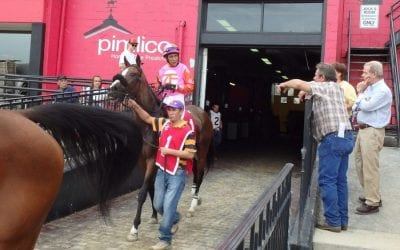
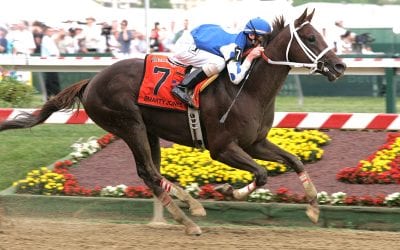
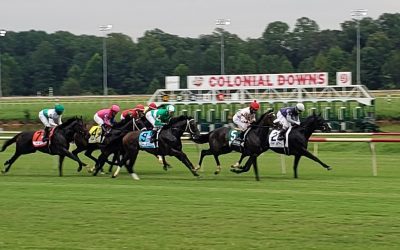

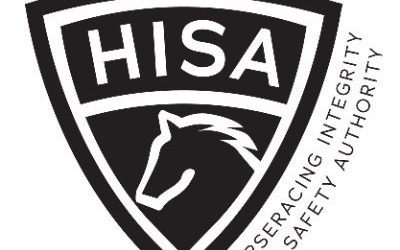
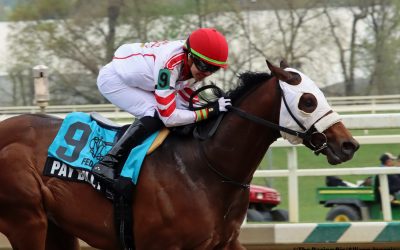






As a relative newby to Arabian racing but not Arabian horses in general I’d like to throw in my two cents worth. My observation is that Arabian racing has been dominated by horses that have pedigrees containing horses that are the subject of questionable ancestry and there appears to be different “camps” in this regard. This rather than bloodstock being sold overseas etc etc this impacts the smaller breeders to a much greater degree. When horses “out of the desert” can be drafted and accepted as purebred and pushed down the throats of organizations worldwide, such discord within the ranks always can cause a negative impact among the troops — that, and the general state of the popularity of the Arabian breed plus continual drops in registrations and members of the parent organization has impacted Arabian racing more than anything IMHO.